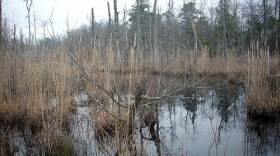New research from N.C. State suggests harvesting wood debris after logging doesn't have a major impact on small animal populations.
Wood pellets made from scraps left behind after clear-cutting are increasingly in demand as biomass, a renewable energy source to fuel power plants in Europe and parts of the United States.
But until recently, little was known about how wood debris harvesting impacts woodland animals. N.C. State forestry professor Christopher Moorman led a four-year study examining how birds, toads and other species use debris at logging sites throughout the South. He concluded the biomass harvest has little impact.
"Generally we saw no differences among the six treatments in terms of the populations of animals or the number of animals we caught," said Moorman.
Even at sites where the debris was reduced by 81 percent, Moorman said animals were able to find alternate sources of food and shelter.
"We know that many of the animal species that occur in these young forests are pretty hardy and can tolerate fairly extreme conditions," he noted.
Moorman said the research suggests the current harvesting practices are sustainable, and there's likely no need to implement biomass harvesting guidelines like those in place in parts of the Midwest.
"In the Southeastern U.S. where we worked, we did not see any empirical evidence that would suggest that [biomass harvesting guidelines] are needed to make these harvests any more sustainable than they already are," said Moorman.
It's not currently cost-effective to gather all debris from a clear-cut site, meaning enough is left behind to help support animal populations. Moorman noted if gleaning practices become more stringent, resulting in less debris left after logging, it may become necessary to reevaluate the need for definitive guidelines.








